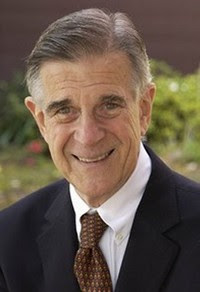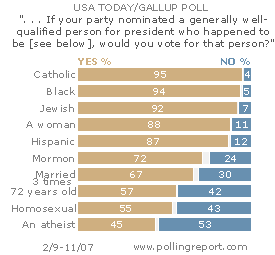I finally came out to my Mom and sister. As an atheist, that is. I’ve noticed that atheists use the term ‘come out’ like gay people do. The comparison is apt. In both cases, you’re confessing something shocking! secret! and socially undesirable. You know your family will be disappointed, and wonder what they could have done differently. And in both cases, there’s really very little you can do to change your orientation. You could fake it, of course, and some people do, but what a waste of your life.
Here’s what family members do when you tell them you don’t believe in God.
They are floored. Then they babble for a minute, asking questions like “Do you think we just evolved? Don’t you know that Satan is working through science? Dad would be rolling over in his grave!” and so on. You can tell they’re thinking, “If I can just say the right thing, then he’ll feel something, and believe again. Now’s my chance! What do I say?” Because of course, what really matters is whether you feel something’s true.
Then they relax a bit and start asking questions. I tried to listen, and answer gently, and be supportive.
“What about all those spiritual experiences on your mission?”
Hey, I’ve had lots of ‘spiritual experiences’, not just on the mission. But experiences are anecdotal, and good data isn’t. A feeling means you had a feeling, not that some spiritual being exists.
“You know, Satan is really working hard, trying to lead people astray.”
What’s that you say? I’m in the grip of an invisible spirit being that may not exist! Oh noes!!!!!!111111!!!!!1one!1 Okay, I admit it was hard to respond to meathead comments like this one gently.
“Are you going to try and lead others away from the Church?”
This was particularly galling. If you believe in all that, you’re meant to shout it from the housetops, but if you believe the opposite, suddenly you’re just supposed to shut the fuck up. Well, a lifetime of evangelism has had its effect, and yes, I will continue to influence people to understand about good evidence, and I will teach critical thinking in my classes, and I’ll be right here on the blog, telling it like it appears to be.
“Well, at least you’re not going to become an atheist, are you?”
I am not kidding, Mom said this. “Well, Mom,” said I, “if you don’t believe in God, an atheist is what you are.” Oh.
The most telling thing was something that both Sis and Mom said. Sis said, “Well, then, what’s the point in all this? Why do you think we go through all this horrible stuff in life?”
I was surprised. “Is life horrible?” I asked.
“Yeah, it really is,” she said. “If I didn’t think I was going on to something better, I don’t know how I’d get through it.”
Atheists are sometimes criticised for saying that there’s no point in life, something I have never heard a real atheist say. It’s true that what we do as individuals really matters very little on the cosmic scale. But my life has a point for me because I give it a point. The only people I hear saying that life on earth isn’t very important is Christians. And, given their assumptions, it makes sense. Compared to eternity, life is just a jot. So why would it matter as long as you get to heaven? Fortunately, most believers act as though they don’t actually believe this, otherwise there’d be an awful mess, no one painting their houses, people plundering the earth’s resources, blowing themselves up for their religion — oh, wait.
Mom said much the same thing. “If I didn’t think Dad was up there waiting for me, I just couldn’t go on.”
And that’s when I thought maybe I was wasting my time saying anything. It’s not like she’s going to change. Some paradigm shifts can drive people insane. And when your worldview or your self-image depends on not understanding, you will not understand. It really gave me an insight into the desperation about life that religious people feel. But it’s not just desperation. It’s hatred. I remembered all those lessons in church about staying unspotted from the World. Don’t get any of the World on you. Hymns describing the earth as a ‘vail of tears’. That’s the view of someone who doesn’t really like life.
Finally Mom said, “Well, the important thing is that you’re a Good Person. And I know you are because of the way you take care of those boys, and the way you live your life.” It seemed important to Mom that I was still a Good Person. I guess I always had the same misconception as she did; that people who break from the Church turn into drug-taking Satanists. But she realised that I had an internalised moral code. So, good for Mom.
I finished my calls with each of them. If I’d called either of them right after that, I’m sure both of their phones would have been busy. And now my open secret’s out. It feels good.






Recent Comments